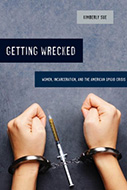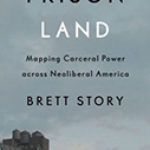Getting Wrecked: Women, Incarceration, And The American Opioid Crisis

Author: Kimberly Sue
Publisher: Oakland, CA: University of California Press, 2019. 264p.
Reviewer: Susan Starr Sered | March 2020
In Getting Wrecked Kimberly Sue, an exciting young physician/anthropologist, traces the history of treatment of women drug users in Massachusetts, analyzes how today’s “carceral-therapeutic state” sets women up for failure, and draws on her own interactions with a number of women opioid users as they try to navigate the criminal justice and medical systems in the Boston area. Throughout the book, Sue demonstrates empathy for the women she has come to know, as well as realism regarding the harshness of their circumstances. While highlighting the women’s strengths, she avoids the trap of focusing on the infrequent “success stories” that tend to make the headlines. Getting Wrecked acknowledges the women’s slim chances of escaping the streets and the institutional circuit, or even of surviving.
Much of the book focuses on the author’s observations and critiques of prison-based drug treatment, drawing particular attention to the failure of the Massachusetts Department of Corrections to provide medication assisted treatments such as buprenorphine and buprenorphine-naloxone (Suboxone) to incarcerated women, especially upon their entering and leaving prison. Instead of the evidence-based and life-saving treatments, prisons continue to rely on so-called therapeutic group practices aimed at encouraging women to talk about the trauma that they have experienced, learn techniques for managing stressful emotions, and draw up life maps for their post-incarceration selves (Chapters 3 and 4). These practices, Sue argues, ignore the structural factors that caused the women to engage in substance mis/use to begin with, as well as the limited opportunities for meaningful post-incarceration employment (Chapter 6). All of these observations and arguments are important and resonate with a large corpus of work by Shoshanah Pollack (“Taming the Shrew: Regulating Prisoners through Women-Centered Mental Health Programming”), Lynne Haney (Offending Women: Power, Punishment, and the Regulation of Desire ), Jill McCorkel ( Breaking Women: Gender, Race and the New Politics of Imprisonment ), Allison McKim ( Addicted to Rehab: Race, Gender, and Drugs in the Era of Mass Incarceration ), Andrea Leverentz ( The Ex-Prisoner’s Dilemma: How Women Negotiate Competing Narratives of Reentry and Desistance ) and others.
In Chapter 7, “Life and Death after Jail”, readers most clearly hear the author’s dual voice as a physician and an anthropologist. While “shooting intravenous drugs means you might die at any moment” (p. 162), she argues that official, medical death is only one part of the civil and social deaths of incarceration, solitary confinement, loss of family, sexual violence and homelessness. Framed around her ongoing relationship with a woman she calls Lydia, Sue follows Lydia’s path from “an innocuous-appearing cut in her armpit [that] ended up as a case of necrotizing fasciitis” (p. 162),multiple hospital and clinic visits, parole office appointments, and a respite care facility for homeless men and women. Despite the high level of clinical care that Lydia received (I would note that this level of care would be far less available in rural areas and in states that declined the Medicaid Expansion offered under the ACA), Lydia died. Sue cogently ponders the limits to the responsibilities as well as the capabilities of health care providers to address problems such as homelessness, incarceration, poverty, drug use, despair and other social determinants of health.
The existence of substantial numbers of excellent studies of women similar to the ones the author worked with is both a challenge and a privilege of doing research in Boston. A great deal is known about the pre-, during and post-prison experiences of Massachusetts’ women who struggle with violent victimization, sexual assault, extreme poverty, homelessness, stigma, criminalization, substance mis/use, drug treatment and the trifecta of carceral, therapeutic and welfare institutions. This literature began with Sheldon and Eleanor Gluck’s 1934 groundbreaking research at the Massachusetts Reformatory for Women ( Five Hundred Delinquent Women) and includes Jody Raphael’s rich trilogy ( Freeing Tammy: Women, Drugs, and Incarceration 2007 and two others) as well as the decade-long ethnographic study of Boston-area women that I conducted with Maureen Norton-Hawk ( Can’t Catch a Break: Gender, Jail, Drugs, and the Limits of Personal Responsibility 2015). These and other studies offer opportunities to utilize and build on a rich corpus of research. The challenge is to dig deeper and reach beyond what is already known about women in a region saturated with colleges and universities. As I read Getting Wrecked, I longed to hear more of Sue’s unique lens as a physician/anthropologist, a lens she presents so well in Chapter 7. I particularly wished to see more details about her research methods: How many of the thirty women whom she initially interviewed was she able to follow longitudinally? How did her identity as a young Asian-American woman and a physician shape her relationships with the women? How did she select women for the study and what are their ages, racial and ethnic identities, etc.?
In the Conclusion, “Breaking ‘Wicked Bad Habits’”, the author’s well-thought-out recommendations include supervised consumption spaces, investing in community health workers who have histories of incarceration and substance mis/use, bringing health care to the places where women like Lydia live or hang-out rather than requiring them to fit into the schedules and rules of brick-and-mortar clinics, and ceasing the use of jails and prisons to treat or punish substance mis/users. As the public conversation regarding substance mis/use switches from punishment to treatment, the insights of a scholar/practitioner who works in the very belly of the treatment beast offers particular value. I very much look forward to hearing more of Sue’s voice as she embraces new opportunities and challenges in her role as Medical Director at the Harm Reduction Coalition.
Susan Sered, Professor, Suffolk University


